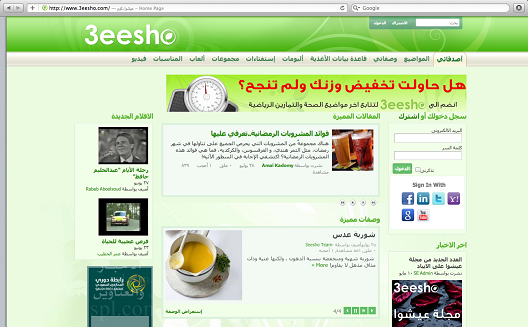Saudi 3eesho brings healthy living to the Arab world

Obesity rates in the Middle East, and especially in Saudi Arabia, are spiraling out of control. Yet information about how to lead a healthy lifestyle, especially in Arabic, is hard to come by. 3eesho aims to fill that gap, by promoting a healthy lifestyle through its online platform and magazine.

“The health issue in the Arab region, and specifically the Gulf region - obesity and diabetes - is a huge problem I feel. I just saw kids around me growing from their waist instead of growing tall, it was sad. I saw that the content on the internet is really very poor,” says 3eesho’s founder and CEO Rafah Khatib.
Speaking over Skype, Khatib is down to earth, laughing when looking back at former obstacles and tchallenges, such as purchasing expensive software before a contract was signed. The company is run by Khatib along with two other founders.
Initially, when she started the idea in Saudi Arabia in 2008, it was supposed to be a mobile app for people to track their daily habits, food, and calorie intake, to compile this information and publish it on an online portal to provide daily statistics. Having run into some technical issues, as well as a lack of smartphone penetration in 2009, she decided to create an online social network instead to teach people how to use the comprehensive tracking application. The founders began creating content about how to craft a healthy lifestyle to accompany the app and it was a hit.
In 2010, they focused solely on the social network to promote the brand and 3eesho name. “We knew there was a huge gap in the Arabic content for original up-to-date information about dieting, a healthy lifestyle, and sleeping habits, but the demand was really excellent,” says Khatib. By 2011 they had an impressive one million regular users.
“But by that time we were actually running out of cash,” she says, laughing; 3eesho was previously running solely on personal investment. This problem was solved by finding a new revenue stream by offering social media marketing and management of online communities for second companies. “We dedicated 50% of our efforts to those services,” she says.
At the beginning of 2012 they signed an agreement with a Saudi agency to put advertising on 3eesho, finally monetizing their traffic. They also began publishing an iPad magazine, an extension of 3eesho.com that added further sponsorship and advertising revenue streams to the startup. “It’s the first of its kind in Arabic” says Khatib.
The site is visited by users from across the region. “We have a good distribution; 30-35% of our users are from the gulf, 30% from North Africa and Egypt, 25% from the Levant and 10% from rest of the world. 3eesho currently has between 350-550,000 monthly visitors and, by 2013, the target is to double that number to a million monthly users. “We are looking to be the number one destination in the Arab world for information about a healthy lifestyle.”
Khatib encountered other problems along the way; it was difficult for people to keep track of what their caloric intake was. “We don’t have a tool for people to track what they are eating, there is no online reference for Arabic food and values, and so we decided this was also a very important tool for people to enhance their lifestyle,” she explains.
An application which will allow you to do just that, featuring an Arabic food nutritional information database and calorie counter, is set to launch at the end of the year.
Knowledge into Action
The biggest problem with any online platform is that people don’t necessarily change behavior just by reading information; everybody knows smoking is bad for you, yet many people still smoke. “The major challenge is to get people to implement and not just read,” Khatib concedes.
By working with local schools and organizing events, Khatib tried to tackle this issue, “In 2010, we were working in the community to do walk events in several cities, in Cairo, Riyadh, Amman, and in Morocco and Tunisia, to get people moving,” she says. However, the political developments in the region prohibited further gatherings of this nature.
Whether 3eesho has a positive effect on its readers is currently discernable only by readers' reactions, which speak to its impact. The most amazing feedback Khatib ever received was from a teenage boy, she recalls. “He had read the magazine 10 times and had almost memorized every piece of content of the magazine! For me it was like an award, because we are able to attract a teenage boy to read a health magazine.”
Other startups such as AlTibbi and WebTeb have sought to educate and empower online Arabic readers to take charge of their health through interactive online medical portals, while Supermama, an online community for mothers in the Arab world, offers information from experts and other mothers about women’s lifestyle in the region.
3eesho doesn't compete directly with those startups in its niche, rather working to bridge the gap between health and lifestyle by educating users about healthy eating and helping them take the first step towards planning their own nutrition.


